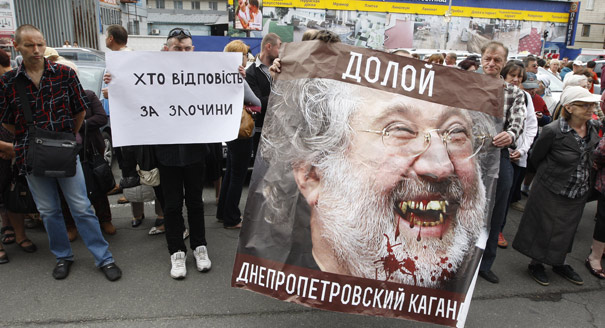Ukrainian President Volodymyr Zelensky is still firmly in the honeymoon period of his rule. The former actor’s approval rating hovers around 70 percent; the country’s Western partners have welcomed his plans for reform; stalled relations with Russia have got off the ground once again; and scenes at a Kiev airport of Zelensky welcoming back Ukrainian sailors who had been imprisoned in Russia silenced even his harshest critics for a time.
The only fly in the ointment of this idyll is the figure of the oligarch Ihor Kolomoisky. Accusations that Zelensky, who rose to fame starring in a TV show that aired on a channel owned by the oligarch and who also has business ties with him, was just a stooge for Kolomoisky emerged back during his election campaign, and have never disappeared.
The latest wave of suspicion that the president and oligarch are in cahoots arose after the former head of Ukraine’s central bank, Valeria Gontareva, accused Kolomoisky of masterminding attacks on her and her property.
In 2016, Gontareva oversaw the nationalization of Privatbank, the financial heart of Kolomoisky’s business empire. The oligarch was accused of fraudulently withdrawing funds from the bank, thereby endangering the stability of Ukraine’s entire financial system (Privat held a third of all Ukrainians’ private deposits). Kolomoisky says that then president Petro Poroshenko and Gontareva colluded to simply expropriate the bank.
The attacks on Gontareva are a murky business: it can’t be ruled out that they were staged, since Gontareva, who currently resides in the UK, faces questions from investigators back in Ukraine, and could do with being granted political asylum in the UK. On the other hand, Kolomoisky’s reputation is such that many people immediately believed Gontareva’s version.
The legal case over Privatbank has long left the confines of Ukraine. In the United States, a civil case brought by the administration of the nationalized bank has attracted the interest of the FBI. The case accuses Kolomoisky and his partner Gennady Bogolyubov of laundering $470 billion.
All of this creates major problems for Zelensky, whose striving to set a new standard of transparency in the state’s dealings with big business so far looks like no more than an admirable declaration of intent.
Kolomoisky fled to Israel while Poroshenko was in power, and returned to Ukraine following Zelensky’s victory, burning with desire for compensation for the damage his business empire sustained under Poroshenko: according to Forbes, Kolomoisky’s fortune halved between 2014 and 2018 to $1.1 billion.
Several court rulings have already been made in Kolomoisky’s favor, challenging the nationalization of Privatbank. It’s unlikely Zelensky had anything to do with that—the first ruling declaring the nationalization illegal occurred before the second round of the presidential elections—but that doesn’t help Zelensky. The way things are right now, any Privatbank ruling could be interpreted as the president giving in to the oligarch as payment for his support in the elections.
In addition, the war Zelensky has declared on the oligarchs so far seems to be somewhat selective. The new parliament, in which Zelensky’s Servant of the People party forms a strong majority, has inflicted several blows against the interests of another oligarch, Rinat Akhmetov, who happens to be Kolomoisky’s rival. He has lost his political protection in the presidential administration and his representation in parliament, while economic reforms enacted by the new parliament have damaged his business interests: proposed tax law amendments to raise taxes for companies mining iron ore would hit Akhmetov hard, while leaving producers of manganese ore—a sector controlled by Kolomoisky and Bogolyubov’s Privat group—untouched.
Kolomoisky’s privileged position in the new regime is forcing his rivals to consolidate against him. A group of major businesspeople linked to Akhmetov and Poroshenko has publicly called for transparent relations between the authorities and business. Among the companies that have expressed support for this warning to the oligarchs is Burisma, the gas company linked to the interests of family members of former U.S. vice president Joe Biden, while the project’s ideologists include Anders Åslund of the Atlantic Council think tank. The anti-Kolomoisky coalition will, it seems, be able to count on major support at an international level.
Zelensky’s opponents are on the lookout for any sign of Kolomoisky’s influence on the new authorities. The president has been criticized for appointing Andriy Bohdan, a former lawyer of Kolomoisky, as his chief of staff. The new prime minister, Oleksiy Honcharuk, has also been linked to the oligarch.
Within Zelensky’s inner circle, a battle is being fought between various influence groups, and Kolomoisky’s protégés are so far winning. Other people variously linked to the oligarch, including the new defense minister, Andriy Zagorodniuk (son of Kolomoisky’s partner in the oil and gas business) and Dmytro Dubilet, the minister of cabinet ministers (he previously worked at Privatbank, along with his father), now occupy key posts in Zelensky’s government.
The dream of radical change in the ruling elite upon which Zelensky swept to power is beginning to collide with Ukrainian reality. At the very least, Kolomoisky has good personal connections within the country’s new leadership, and is publicly showing himself to be well informed of what goes on behind closed doors—though this media activity may in itself indicate a loss of real influence that he is trying to compensate for with a series of inflammatory inside revelations.
Kolomoisky has made use of his ambiguous position as the future president’s business partner since the start of Zelensky’s election campaign, but this didn’t prevent Zelensky from sweeping to victory in the elections. Now, however, the trickster oligarch is becoming increasingly toxic for Zelensky’s team, not only within the country but also abroad. Kolomoisky’s reputation is ruined beyond repair in the West, where legal proceedings involving the oligarch are ongoing. He is no more popular in Moscow, where Russian President Vladimir Putin has described him as a conman. Tellingly, while the Kremlin is ready to talk to Zelensky directly, there is no dialogue at the level of the chiefs of staff: Bohdan complains that Moscow won’t take his calls. The Kremlin is clearly convinced that Bohdan is a mouthpiece for Kolomoisky.
Kolomoisky doesn’t carry much truck with U.S. President Donald Trump either. Trump’s lawyer, Rudy Giuliani, has tweeted that Kolomoisky is “super dangerous.” The oligarch’s long reach can also be detected in Europe, where it was recently reported that Kolomoisky is suspected of buying a deputy’s seat in the Austrian parliament for a business partner—representing the far-right Freedom Party, no less.
All this activity by the oligarch doesn’t sit well with Zelensky’s promises to do things differently, and a definitive showdown between the two men can probably not be avoided. Time, it must be said, is not on the oligarch’s side. Kolomoisky is one of a dying breed in the post-Soviet space: a romantic of unfettered capitalism. Oligarchs who strive to replace the state with their own persona are being defeated one after another: Vladimir Plahotniuc’s regime has fallen in Moldova, and the Georgian oligarch Bidzina Ivanishvili is in a precarious position.
Sooner or later, the interests of the Ukrainian president and the oligarch who endorsed him will become incompatible. Kolomoisky has already criticized the new government’s plan to put land plots up for sale, prophesying that the move will lead to a bloody revolution in Ukraine. Similar points of contention will quickly mount up, until the time comes when Zelensky will have no choice but to distance himself from all the oligarchs alike, without exception.













